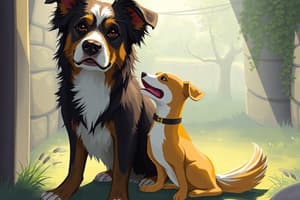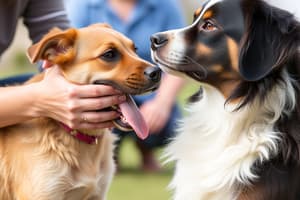Podcast
Questions and Answers
Which breed group do Chow-Chows and Lhasa Apsos belong to?
Which breed group do Chow-Chows and Lhasa Apsos belong to?
- Toy
- Non Sporting
- Working (correct)
- Herding
During the Seniority Classification Period, what changes occur in a puppy?
During the Seniority Classification Period, what changes occur in a puppy?
- Increased independence
- Testing of leadership roles
- Physical growth
- All of the above (correct)
Which statement about dogs compared to wolves is incorrect?
Which statement about dogs compared to wolves is incorrect?
- Dogs generally have thicker skin than wolves.
- Dogs tend to have 50% smaller brains than wolves. (correct)
- Dogs are better at observational learning than wolves.
- Dogs have 20% smaller skulls than wolves.
During which development stage can reactivity increase in dogs?
During which development stage can reactivity increase in dogs?
What behavior might a puppy display as it begins to assert its place in the world?
What behavior might a puppy display as it begins to assert its place in the world?
Flashcards are hidden until you start studying
Study Notes
Breed Classification
- Chow-Chow and Lhasa Apso belong to the Working breed group, known for their strength and utility.
Puppy Development Stages
- During the Seniority Classification Period, puppies begin to establish their place in the social hierarchy and test boundaries.
- Puppies will display behaviors to clarify leadership roles, showing assertiveness and increased boldness.
- This period is characterized by rapid growth and exploration.
Misconceptions about Dogs and Wolves
- It is a misconception that dogs have 50% smaller brains than wolves; in reality, they have smaller skull sizes, but not to that extent.
- Dogs generally have 20% smaller skulls compared to wolves, affecting their cranial capacity.
- Domestic dogs are less adept at observational learning than wolves, indicating differences in cognitive abilities.
- The skin of domestic dogs is typically thicker than that of their wild counterparts, providing more protection.
Reactivity in Dogs
- Reactivity in dogs can increase during the Second Fear Period, a developmental stage characterized by heightened anxiety and wariness of new stimuli.
- Other significant developmental periods include the Flight Instinct Period and the Canine Socialization Period, where different aspects of behavior and interaction are developed.
Studying That Suits You
Use AI to generate personalized quizzes and flashcards to suit your learning preferences.




